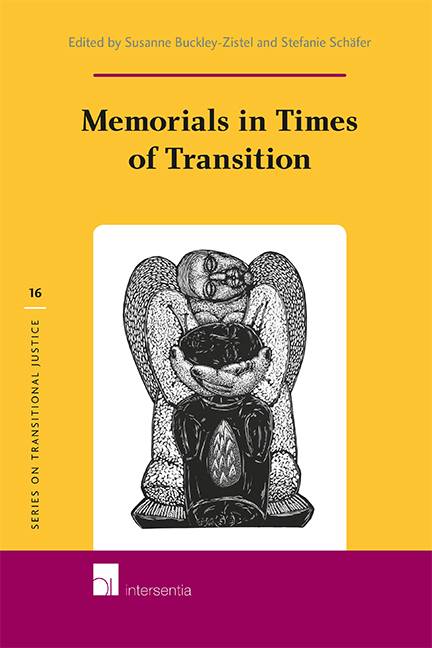Memorials in Times of Transition
Published online by Cambridge University Press: 16 December 2020
Summary
In January 2011, a small delegation of Rwandans travelled to Germany to meet with representatives and curators of the most significant Holocaust memorial sites. The group, comprised of representatives of victim organisations, the Kigali Memorial Center, the Commission for the Fight against Genocide as well as peace initiatives, had ventured on this journey to learn about the German experience with remembrance and commemoration in order to draw lessons for their own memory work. For despite all differences, what both countries have in common is a past marked by extreme violence, by genocide. And both seek to redress the past by means of building or conserving physical structures as sites of memory: memorials.
This is by no means an isolated scenario. Since the 1960–70s, we can see a worldwide upsurge of memorial projects that address the violent histories of recent wars, genocides and systematic human rights abuses. They include the Tuol Sleng Genocide Museum in Cambodia, the Escuela de Mecánica de la Armada (ESMA) in Argentina, the Robben Island Museum in South Africa, as well as many others some of which shall be investigated more closely in the context of this volume. Such interventions often employ a common architectural language and are informed by a set of political and ethical claims in regard to what role commemoration can and/or should play after large-scale violence: providing public sites of mourning, putting past wrongs right, holding perpetrators accountable, vindicating the dignity of victims-survivors and contributing to reconciliation.
Dealing with the legacy of the past is subject to transitional justice, a concept which has gained in popularity since it was first coined in the 1990s and which refers to ways and means of providing justice for past abuses in times of transition from violence to, at its most basic, peaceful coexistence. Conventionally, it incorporates a number of mechanisms such as truth commissions, tribunals, lustrations, reparations and more recently also memory work – including memorials – in order to deal with past injustices. It is based onthe assumption that any form of transition from violence to peaceful coexistence requires the disclosure of past events and the establishment of some form of justice for the victims in particular and the society in general.
- Type
- Chapter
- Information
- Memorials in Times of Transition , pp. 1 - 26Publisher: IntersentiaPrint publication year: 2014
- 6
- Cited by



